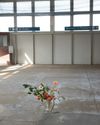
If you work or live near the World Trade Center, you are regularly confronted with impermanence. A pathway that has been blocked for months (years?) by plywood partitions and concrete barricades is suddenly accessible as a corridor for authorized vehicles and swarms of tourists. Corrugated tin walls, a shield for large-scale HVAC equipment resembling steampunk vents, become a cheery Instagram backdrop when splashed with colorful murals. A Biergarten sprouts on a concrete patio; a subway entrance improbably opens where the sidewalk seemed impermeable. Men in suits have been supplanted by nannies pushing strollers into the Wall Street–adjacent Whole Foods. This corner of New York grows in unpredictable ways.
So those of us who watched the construction of the giant marble cube next to the memorial might be forgiven for a little nonchalance: another set of steel foundations, dug deep then stretching high. But the opening of the Perelman Performing Arts Center—or PAC NYC—marks a historic moment: The last public building erected as part of the original master redevelopment plan for the World Trade Center site created by Daniel Libeskind, it has been two decades in the making, hamstrung not only by bureaucratic complexities but by stalled design plans and a rotation of artistic organizations—the Joyce Theater, the Drawing Center, the Signature Theatre, New York City Opera—that each had, at one point, been proposed as potential tenants. (The man after whom the center is named, Ronald O. Perelman—he declined to speak for this story—while credited with providing the initial funding, is no longer the biggest donor. That honor belongs to Michael Bloomberg.)
This story is from the September 2023 edition of Vogue US.
Start your 7-day Magzter GOLD free trial to access thousands of curated premium stories, and 9,000+ magazines and newspapers.
Already a subscriber ? Sign In
This story is from the September 2023 edition of Vogue US.
Start your 7-day Magzter GOLD free trial to access thousands of curated premium stories, and 9,000+ magazines and newspapers.
Already a subscriber? Sign In

SCREEN TIME
Three films we can't wait to see.

Impossible Beauty
Sometimes, more is more: Surreal lashes and extreme nails put the fierce back in play

Blossoms Dearie
Dynamic, whimsical florals and the humble backdrops of upstate New York make for a charming study in contrasts.

HOME
Six years ago, Marc Jacobs got a call about a house designed by Frank Lloyd Wright. Making it his own, he writes, would be about love, commitment, anxiety, patience, struggle, and, finally, a kind of hard-fought, hard-won peace.

GIRL, INTERRUPTED
Anna Weyant found extraordinary fame as an artist before she had reached her mid-20s. Then came another kind of attention. Dodie Kazanjian meets the painter at the start of a fresh chapter

ROLE PLAY
Kaia Gerber is someone who likes to listen, learn, read books, go to the theater, ask questions, have difficult conversations, act, perform, transform, and stretch herself in everything she does. That she's an object of beauty is almost beside the point.

CALLAS SHEET
Maria Callas's singular voice made her a legend on the stage. In a new film starring Angelina Jolieand on the runwaysthe romance continues.

BOOK IT
A preview of the best fiction coming

GLOBAL VISTAS
Three new exhibitions offer an expansive view.

MONDAYS WITH MARC
Just how many Met Galas has Marc Jacobs attended? A few of his favorite guests recount fanciful nights at the museum-past and present.